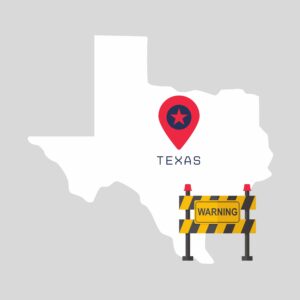As bans on abortion are becoming more popular in conservative states after the overturn of Roe v. Wade, some states are making it their mission to tighten their control on abortion access. Texas, Idaho, and Missouri are starting to restrict and ban interstate abortion travel. This is being done by passing ordinances in various cities close to interstate highways, and criminalizing assisting those looking to receive out-of-state abortions. However, the constitutionality of these laws is up for debate, as the constitution protects the right to interstate travel.

Texas Abortion Travel
In the state of Texas, ordinances have been recently passed in the cities of Odessa, Little River-Academy, Gollad, and Mitchell Counties that make it illegal to transport a woman across state lines for an abortion. All four of these localities lie on interstate highways, making travel even harder.
For example, Interstate 20 cuts directly through Mitchell County, and is regularly used by Texans who are on their way to New Mexico, a state where abortions are legal at all stages of pregnancy. These ordinances allow people to file civil lawsuits against a person who is suspected of driving someone across state lines to get an abortion. However, the silver lining is that these laws protect the person who needs the abortion as they cannot be sued.
Idaho Abortion Travel
Back in April, Idaho passed a law that makes “helping a pregnant minor get an abortion, whether through medication or a procedure, in another state punishable by two to five years in prison.” This includes helping a minor in any way travel to another state for an abortion. This makes it particularly difficult to make it to neighboring states like Oregon, Washington, and Nevada where abortion is still legal. This even includes giving them money or helping them make travel plans. In this regard, Idaho’s ordinances are unlike Texas’ which allows private citizens to sue people they think are assisting with an abortion; the Idaho law specifically criminalizes the act and threatens time in prison.
Currently this law only targets minors and not adults, however there is an argument that the scope of this law could expand. According to Elisabeth Smith, the director of U.S. state policy and advocacy at the Center for Reproductive Rights “that is the way, historically, all abortion restrictions have begun: by first limiting young people’s access, and then moving to adult access.”
Missouri Abortion Travel
Back in 2022 Missouri lawmakers proposed a similar law that would allow people to sue anyone who helped a Missouri resident get an abortion. While the state’s house of representatives blocked the provision, that did not stop it from becoming a blueprint for other states implementing travel bans. Republican state Rep. Mary Elizabeth Coleman specifically stated that this law targeted a specific “Planned Parenthood clinic in Illinois just across the river from St. Louis that opened in 2019 with the explicit goal of serving Missouri patients.”
Illinois: A Safe Haven
In January of 2023, Illinois wanted to make it even easier for out-of-state residents to receive abortions within the state by adding an amendment to their reproductive health act. This amendment stated that Illinois would no longer report abortion numbers for illinois counties or by the specific state of out-of-state residents. This was meant to provide further privacy to out of state residents looking to receive an abortion and protect them from some of the interstate travel laws, such as the one proposed in neighboring Missouri. By simplifying the types of data collected from healthcare providers and changing what type of data it shares with the public, Illinois is turning into a safe haven for women seeking abortions. This amendment protects the right to abortion and forbids the state government from interfering with a woman’s decision making process while giving birth.
Constitutionality
Many lawmakers within and outside of these states have brought up the constitutionality of these interstate travel laws. Federally, banning interstate travel is unconstitutional making the future of these bans uncertain. The constitution protects the right to interstate travel implicitly in both Article IV and the 14th amendment. Unfortunately, “because the laws can be enforced by any private citizen, abortion rights groups have no clear government official to sue in a case seeking to block this law”. Furthermore, there have been arguments comparing these laws to the Mann Act, which prohibits transporting women across state lines for prostitution. This does restrict interstate travel, so if transporting women for abortions is illegal, this act would support that position as it has been considered law for over 100 years.
However, time and time again the Supreme Court has upheld the precedent that interstate travel is constitutional and would not allow even small restrictions on travel. This includes the court case Crandall v. Nevada, where the supreme court struck down a Nevada law that imposed a $1 tax on every person leaving the state. If a law with as insignificant of a burden as this one can be struck down by the court, there is hope for women everywhere that the travel bans on abortion would not be upheld in court either.
Fear Tactics: Enforcement and the Impact on Women
On the bright side, most of these ordinances don’t punish the woman seeking an abortion directly, but they do punish the person helping them cross state lines instead. This would still be detrimental to women-helping-other-women. Some of these punishments, like the one in Idaho, are severe enough to discourage many people from helping women seeking abortions. These laws still harm women by placing more restrictions on the abortion care they need. They also harm women by making it acceptable to take away their constitutional right to interstate travel. It is unlikely that laws restricting men’s constitutional rights would be as easily passed as these ordinances were.
Additionally, these laws would be very difficult to enforce. It is unlikely that police will be stopping every suspicious car that attempts to leave the state. However, they do create a sense of fear for women and could be effective deterrents in making them rethink their travel plans. These laws are mainly enforceable or reported by private citizens, which means enforcement would come from people closest to the women needing abortions. Boyfriends or parents with access to text messages, location data, and knowledge of your cycle would be the people best positioned to file a lawsuit or alert authorities.
How to Help
Don’t allow legislators to take away your constitutional rights. If you are in a state where one of these laws has passed, make sure you vote in local elections and contact your local legislators to discuss the constitutionality of these laws. Circulate petitions and spread awareness! To make a national impact you can support the Freedom to Travel for Health Care Act (2023) and encourage your state congressmen to do the same. This is a bill that is up for vote in congress and would further protect women’s right to travel. This law would also make it easier for the federal government to intervene and sue states that restrict this right.
If you live in one of the affected states keep yourself safe by keeping your data private. Don’t use period track apps that could be used against you in court of law. If you plan on making a journey out of state be careful with what you say over text message and who you share your location with. There are also abortion funds you can donate to that aim to help women at local, state, and national levels! Go to abortionfunds.org to learn more. Pandia Health always aims to keep you informed about threats to your rights and help with solutions to protect yourself and others!



